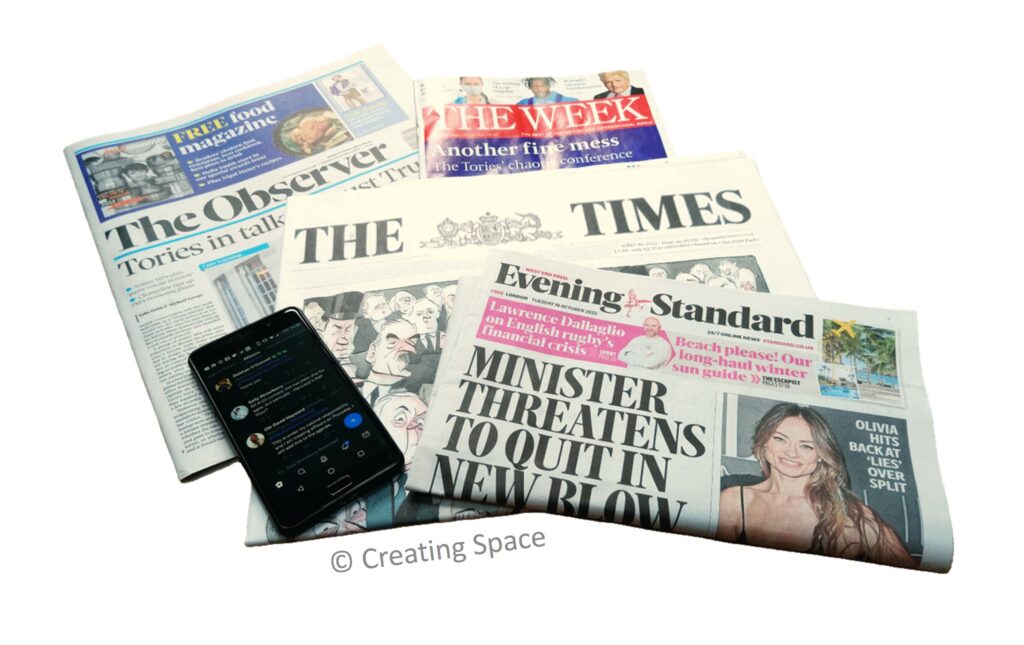
I am currently waiting for my husband to come home from the pub. It’s a bit later than I thought he would be back.
I’m not a great worrier or a particularly anxious nature, but I am carrying a low level of worry right now. It’s Saturday night, I can hear raucous talk outside from others enjoying increasing levels of drink, and the night-time streets feel like they can hold all sorts of dangers. I’ve also read too many news stories of situations that can take an unexpected turn leading to hospital visits or worse. So I know that I won’t sleep unit my husband is home safe and sound.
The thing is, violent outbursts or other worse-case imaginings are actually very rare, despite the papers being filled with them. But fear and anger are great ingredients to sell newspapers/incite clicks, all making someone who is publishing these stories money.
Media has always been about profit, like most other businesses. Of course, there are some great platforms/publications which value good investigative journalism above income, but the vast majority of news platforms that are consumed by most people are in the profit-making category. So let’s park that in the back of our minds, alongside the knowledge that scary and scandalous stories sell more than wholesome, happy stories.
The current world situation is a real gift to the media with its stream of unsettling and unpredictable statements. Look away for a moment and you’ve missed the latest trade deal or other event happening in the political sphere. We continue to face price increases in many areas, healthcare backlogs and general concerns about the effects of social media on the younger generations.
We are also confronted with deeply worrying trends regarding the health of our planet and the future that the next generation will be faced with: the wars raging in Ukraine, the Middle East and Africa, and the persecution of entire ethnic groups. All of these world events leave us questioning how human beings can possibly be doing such things to one another.
The list of big topics that are almost too complex to comprehend fully and which we are unable to influence or impact very much on a day to day basis without a significant shift in priorities is long.
Being constantly bombarded with stories and reminders of everything that is wrong in the world is destructive to us. It is hugely anxiety-inducing and causes us to carry a sense of doom around with us that takes much effort to shake off. And much of this anxiety is created by an industry, for profit.
So let’s de-clutter our news consumption.
I am not suggesting that keeping up to date with events is altogether bad, or that we should delude ourselves by putting our heads in the sand. What I am proposing is to reduce our intake of news. Let’s not look at the latest stories first thing in the morning, during our breaks, every evening, just before bed, and I would even go as far as to say every day full stop. I once read a story about someone who read no news at all and trusted that if anything significant happened, he would find out somehow. That is the other extreme of course. Find what’s right for you.
Here are some suggestions:
-
- Pay attention to your habits around news consumption and consider setting a specific amount of time aside for it.
- Keep in mind the manipulative nature of headlines and reporting styles, and notice what emotions they bring up in you.
- Seek out balanced, factual reporting rather than sensationalized content designed to elicit a strong emotional response.
- Check in again after a few days and see if your changes were successful. If not, consider why they weren’t and what else would work better for you.
- Find a professional to help wean yourself off from the news addiction.
Whatever you choose to do, do it now. Not tomorrow. Not next week. But now.
PS: My husband has just come home. He’s completely fine of course and enjoyed his night out. As for me, my writing was cathartic.
